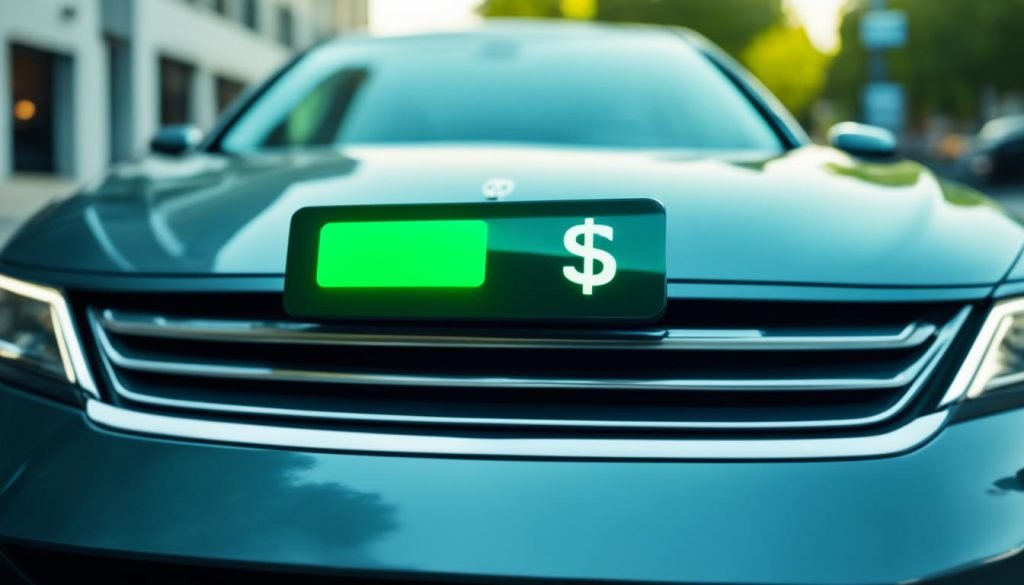Managing your car loan well can lower your monthly payments and get you better interest rates. Car loan refinancing is when you get a new loan to pay off the old one. This step can cut down the interest you pay. It might also shrink your monthly bills, giving you more financial breathing room.
Key Takeaways:
- Car loan refinancing involves obtaining a new loan to pay off your existing car loan.
- Refinancing can potentially lower your interest rates and reduce your monthly payments.
- By refinancing your auto loan, you can save money on interest over the life of the loan.
- Car loan refinancing provides an opportunity to take control of your finances and improve your financial situation.
- Stay tuned for the step-by-step guide on how to refinance your car loan.
When Should You Refinance your Car Loan?
Refinancing your car loan can be wise with the right situation. Some key times make it good to think about. Knowing these can help decide if it’s a good choice for you.
One good time is when interest rates are lower now. This means you might get a new loan with a better rate. Lower rates cut your monthly payments. Then, you have more money for other needs or wants.
Think about your credit score and financial health too. A better credit score could get you a loan with a lower interest rate. That could save a lot of money over time.
Use an auto refinance calculator to see if it’s worthwhile. Put in details like your current loan info and compare it to new options. The calculator shows how much you could save.
Refinancing smartly can cut your interest costs and reduce what you pay monthly. Think about the interest rates now, your credit score, and use a calculator. This process helps decide when reworking your car loan is best.
| Factors to Consider: | Refinancing Benefits: |
|---|---|
| Lower interest rates | Reduction in monthly payments |
| Improved credit score | Potential savings on interest over the loan term |
| Better financial situation | Opportunity for better loan terms |
Is it the Right Time for You?
Deciding when to refinance needs looking at many factors. Think about current interest rates and your credit score. Also, consider what you hope to achieve financially. And, see if savings from refinancing are more than the costs.
Getting advice from a financial pro or a lender you trust is always smart. They can look at your unique situation and guide your decision. With careful thought and advice, you can figure out what’s best for you.
How to Refinance Your Car Loan
Refinancing your car loan can save you a lot of money. It helps lower the interest and your monthly payments. To start, here are the steps to follow:
- Look at your current auto loan closely. This includes your monthly payment, APR, loan’s remaining months, and the payoff amount. It’s vital for comparing refinance options.
- Figure out your car’s current value. Knowing this will show if you can get a refinance based on your car’s equity.
- Check your credit score. This is important for getting a new auto loan. Always look over your credit report to catch any mistakes that could affect your chances.
- Shop around for lenders. Compare what’s out there. Find those that focus on car loan refinancing and offer good rates and terms.
- Use a refinance calculator to see how much you can save. Add your current loan details and compare them to new options. This will help you pick the best deal for your wallet.
After you’ve done all your research and comparisons, you can select the best refinance for your car loan. Remember, there might be fees and costs. Make sure to include these in your decision.

Refinancing can make your financial life easier and save bucks in the future. By looking at all your choices wisely, you can get a better car loan deal. Enjoy paying less each month.
Tips for Lowering Your Car Payment Before Buying
If you want to cut your car payment before getting a new one, try these ideas. Start by looking for the best financing options. Different lenders offer various rates. Lower rates mean you pay less each month. This saves you money over time.
Another way to lower your payment is to save up for a big down payment. A big down payment means borrowing less. That makes your monthly payments smaller and easier to handle.
It also helps to work on your credit score before you get a loan. A better score can get you a lower interest rate. You can improve your score by paying off debt and always paying on time. Check your credit report for mistakes which can be corrected.
Thinking about buying a used car is smart, too. Used cars are often cheaper. This means both your loan and monthly payments can be lower.
By following these steps, you can make your car more affordable. Lowering your car payment is possible with the right moves.

Conclusion
Refinancing your car loan can be a wise choice. It lets you manage your auto financing better and could save you cash. By using the steps in this guide, you can get better loan rates, cut your monthly payments, and ease the stress of your car debt.
It’s key to shop around, check your credit, and get all the info you need before deciding. Refinancing gives you a chance to improve your money situation. Research your options well and choose what’s best for your needs. With lower rates, you can find a refinancing plan that fits your budget.
Don’t be discouraged by high interest rates and big monthly bills. Look into refinancing today. Lowering your payments and cutting loan costs is doable. Take control of your car loan debt now to save money and build a stronger financial future.




